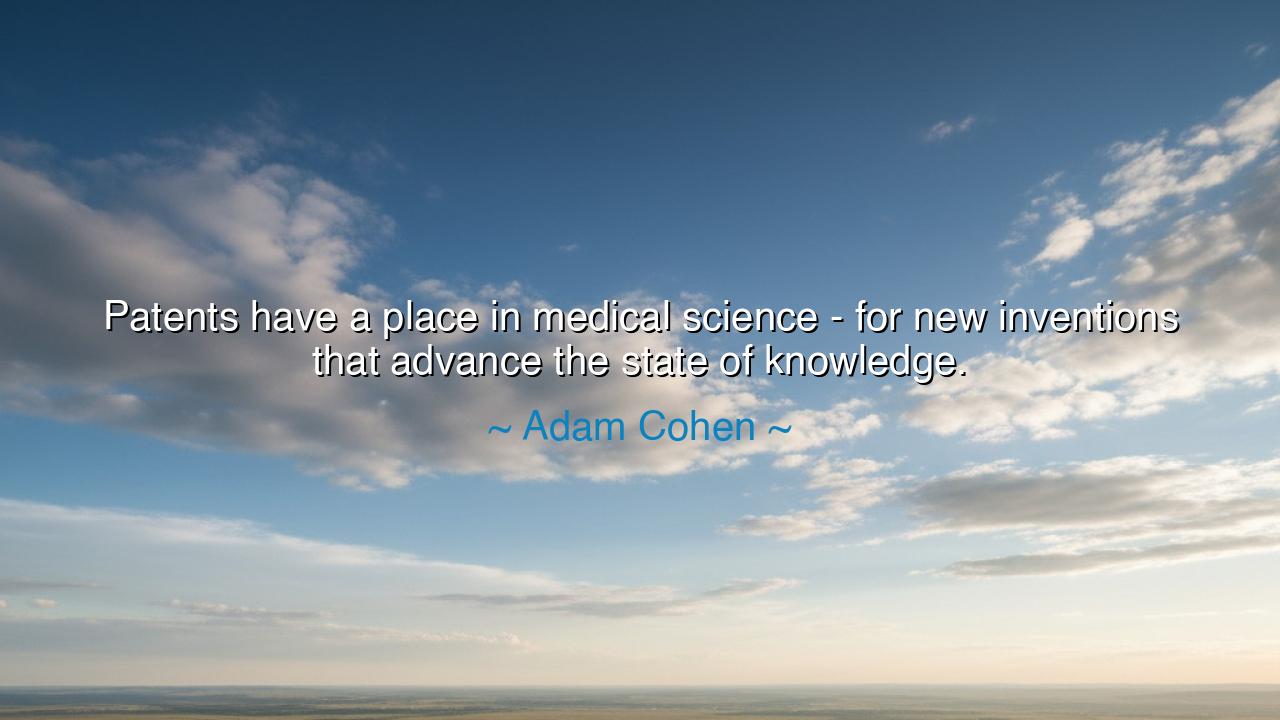
Patents have a place in medical science - for new inventions that
Patents have a place in medical science - for new inventions that advance the state of knowledge.






Hear the words of Adam Cohen, who speaks with clarity on the delicate balance between knowledge and ownership: “Patents have a place in medical science—for new inventions that advance the state of knowledge.” In these words lies both affirmation and caution. He acknowledges the power of patents, which grant reward and protection to the innovator, but he also defines their rightful boundary: they belong only where true advancement of knowledge occurs. For in medicine, knowledge is not mere treasure, but the lifeblood of human survival.
The origin of this truth arises from centuries of struggle between discovery and access. From the earliest days, healers shared remedies freely, passing them down from teacher to student, family to family. But with the rise of modern science and industry, discoveries became commodities. The law of the land created patents, granting inventors exclusive rights. In many fields this spurred invention, but in medical science, the stakes were higher. For here, to guard knowledge too closely is not to withhold luxury, but to withhold life. Cohen’s words remind us that patents must serve the greater good, not choke it.
The ancients would have recognized this wisdom. In Alexandria’s great library, knowledge was collected from across the known world, and it was believed that such wisdom belonged not to one man but to all humankind. Yet even then, rulers sometimes hoarded knowledge for power. The struggle between sharing and possessing has always been with us. Cohen’s statement shines as a guiding principle: patents are just only when they bring forth new inventions, new cures, new ways of saving lives—and when they expand the horizon of knowledge for all.
Consider the story of Jonas Salk, the man who gave the world the polio vaccine. When asked who held the patent, he replied, “There is no patent. Could you patent the sun?” For Salk knew that the vaccine’s power lay in universal use, not in profit. His gift freed generations from the scourge of paralysis. Contrast this with stories of life-saving drugs priced beyond the reach of the poor, their patents guarded fiercely by companies, while millions suffer or die. Here we see the battle Cohen names: patents may uplift or destroy, depending on how they are wielded.
The meaning of Cohen’s words, then, is not to abolish patents but to sanctify their purpose. In medical science, patents are not ends in themselves but tools. They must honor the healer’s oath: to advance knowledge, to foster discovery, to serve humanity. When they are used to reward true innovation—new instruments, new treatments, new knowledge—they fulfill their rightful place. But when they are twisted into walls that block access, or shields that protect profit over lives, they betray their purpose and burden the world with unnecessary suffering.
The lesson for us is clear: we must measure every use of law, invention, and reward against the standard of humanity’s good. In medicine, the first question is not, “Who profits?” but “Who lives?” If a patent advances knowledge and creates new cures, honor it. But if it strangles access and hoards life-saving remedies, oppose it. The wisdom of Cohen’s words is to see patents not as idols, but as servants, useful only when they uplift the human family.
Practical action flows: support policies that balance innovation with access. Praise and reward inventors who give freely, like Salk, and question those who guard too fiercely. As citizens, advocate for systems that prevent exploitation while encouraging discovery. And as individuals, remember that knowledge is sacred—it is meant to heal, to guide, and to be shared.
Thus, Cohen’s words endure as a torch of guidance. Patents have a place, yes—but only when they advance the state of knowledge and serve the greater work of medicine. Let us take this principle into our hearts and our societies, that innovation may flourish, yet life and dignity remain the truest reward. For in serving humanity first, all inventions find their noblest place.






AAdministratorAdministrator
Welcome, honored guests. Please leave a comment, we will respond soon